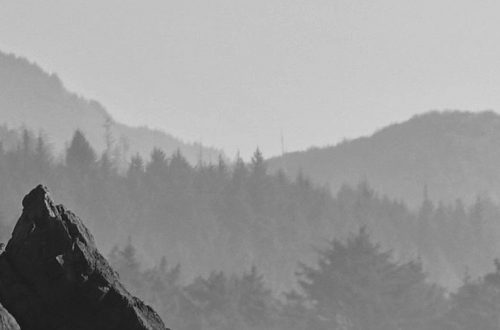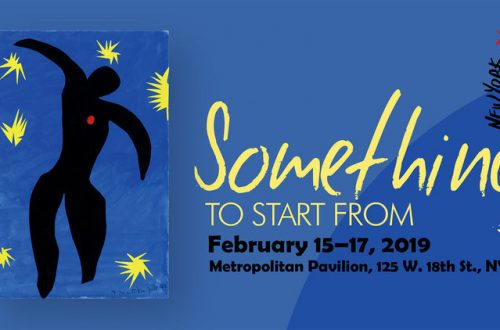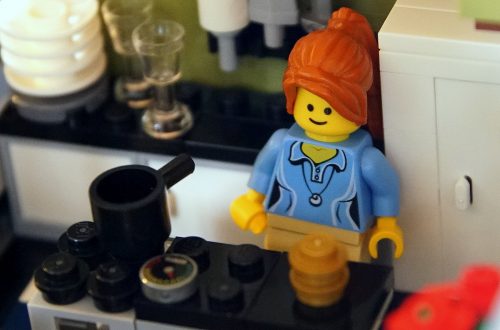by Colleen Coleman
As she has been doing for as long as I can remember, she interrupted the conversation. I was leaning against the kitchen counter, tea in hand, listening to my house-mates count off the woes of life under quarantine, naming a few woes of my own, and sinking with them into melancholy. But, there she was, peering in through the kitchen window, bright and alive. Years of experience have taught me that the best thing to do when she arrives is to drop whatever I’m doing and welcome her. So, I turned off the lights, pointed across the kitchen, closed my lips, and looked out the window. And here is what I saw:
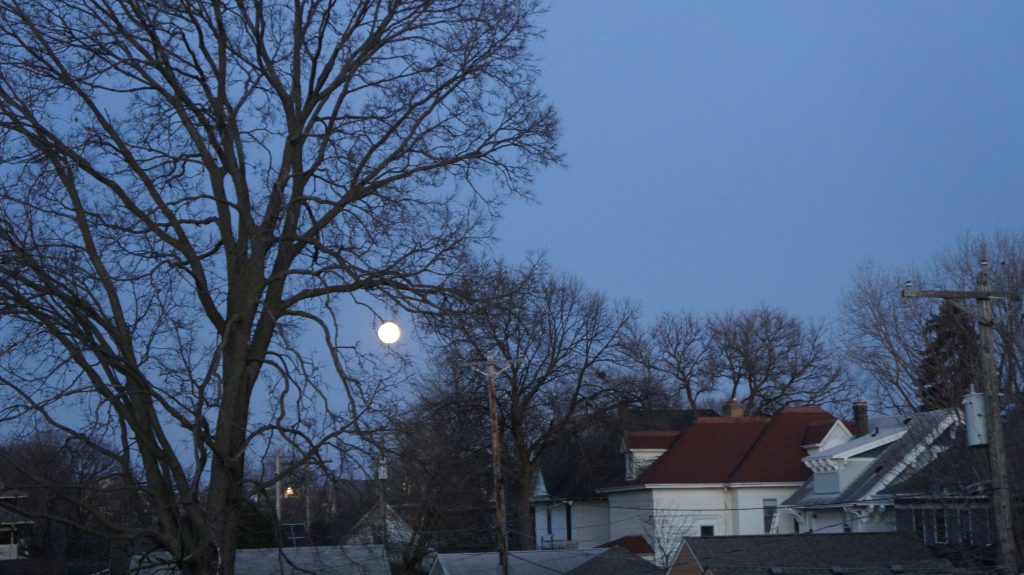
I stood still and marveled at the breathtaking beauty of the moon. Minutes passed in this silence and soft light. I listened. A few similes came to mind to describe the moon in its moment of beauty. It looked very like a ripe peach, hanging from the tree, delicious and ready to be picked. It looked like an unleavened, Eucharistic host. It looked like the sun. But, taking up most of my mental space in the moment was nothing quite so serious or poetic. Taking up most of my mental space was a vague recollection of an illustration from a picture book that had been read to me as a child. I couldn’t remember the book, but I knew that the particular illustration depicted a girl wearing red rain boots, the moon set against the blue sky, and a gorilla. I found the image—it was from Gorilla by Anthony Browne (a book that has a little of the bizarre and the sad, as well as the beautiful).
I laughed at the incongruity between the solemn reverence I felt as I looked out at the moon and the whimsy of the illustration my memory had brought to mind.
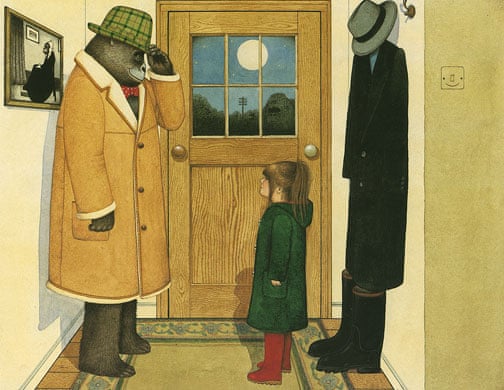
After we marveled at the moon, we listened to the story. We laughed at the picture and enjoyed the other illustrations. We mused over the meaning of the girl’s friendship with the gorilla (Why was the gorilla wearing her father’s coat and hat?). With each page came more wonder and more laughter. The moon and the memory of it had alchemized sadness into laughter.
As I searched my memory further, I smiled when I realized that this was just the kind of magic, just the kind of alchemy, which the moon has been working in my life for as long as I can remember.
It started in my childhood. I was taught to mind my manners when the moon made her appearance. Each night, my siblings and I would look for the moon so that we could greet her and say good night. We called her La Luna. She was a great, noble lady, as well as a magician—a wise old woman, with long silvery hair, who was friendly as well as wise, but who also had all sorts of tricks up her sleeve. We became more aware of her magic in a concrete way when one night on our way back home, we stepped out of the car to realize that she had followed us all the way from our cousins’. Magic.
As is often unfortunately the case, in growing up I forgot some of this etiquette. I no longer greeted the moon each night and I don’t know exactly when or where or why I lost my manners. It is the fortunate case, however, that the moon continued to interrupt and work her magic. And, I did listen when she interrupted; my manners were not wholly lost. Walking across campus late at night, on my way back from the library or dinner as a college student, my mind preoccupied, I would catch sight of the moon and stop. I would look around and find the scene around me transformed. It was as if the moon was inviting me to look at what I would have otherwise left overlooked—the beauty of a telephone pole against the sky at dusk, the complementarity of a deep blue sky and a red roof, the shadows that stretched themselves across the lawns, the hushed expanse of the world. The moon reminded me: “Look up! Look around!” I did. And, the world around me seemed to expand. My preoccupations shrunk to insignificance. In this, the world before my eyes underwent something like a redemption or a revelation. It was made again beautiful and again loveable. Beauties and aspects of things that were hidden were made visible. It was magic, again—the magic of seeing anew.
In Watership Down, Richard Adams beautifully describes the moon’s magic of transforming the world around us:
We need daylight and to that extent it is utilitarian, but moonlight we do not need. When it comes, it serves no necessity. It transforms. It falls upon the banks and the grass, separating one long blade from another; turning a drift of brown, frosted leaves from a single heap to innumerable flashing fragments; or glimmering lengthways along wet twigs as though light itself were ductile. Its long beams pour, white and sharp, between the trunks of trees, their clarity fading as they recede into the powdery, misty distance of beech woods at night. … And its low intensity—so much lower than that of daylight—makes us conscious that it is something added to the down, to give it, for only a little time, a singular and marvelous quality that we should admire while we can, for soon it will be gone again.
The magic of seeing the world anew, as we do when we see the world in moonlight, ripens into the sense that “we should admire while we can.” I’m not aware of a word that captures the urgent feeling that can sometimes wash over you when you see something beautiful and try to hold on to some of the beauty before it gets away. It’s the feeling that prompted me to grab my camera and snap a photo of the moon rising above the alley outside my kitchen window. Maybe it is joy. Maybe it is gratitude. Maybe it is some combination of love for the goodness of it and fear for the fleetingness of it. It is the desire to be present enough and see clearly enough so that in the future, you can remember the moment. It’s the feeling Edna St. Vincent Millay expresses in her poem “God’s World”: “O world, I cannot hold thee close enough! … Long have I known a glory in it all, / but never knew I this; / Here such a passion is / As stretcheth me apart…”
Beholding might be a good word for this feeling that the moon and all beauty inspires. “Behold” is from the Old English bihaldan which translates ‘to thoroughly hold.’ This seems right. The moonlight makes me want to hold the world, embrace the world with outstretched arms, for all that it is, while it is. And the next night, as I sat down at my dining room table to write about my encounter with the moon during an evening in quarantine, I looked out. And there she was. She was not peachy now, but bright white, and set against a background of pitch black, not blue. But she had followed me. And, I take comfort in knowing that she will continue to follow me and whisper her ever-important reminder, “Behold.” Goodnight, moon.

Colleen Coleman is from Michigan but is still learning how to survive the winters in Minnesota. Admiring birch trees and ferns, talking with friends over tea, writing letters, making music, rock-hunting on Lake Michigan, book browsing (and reading), and cooking are a few of her favorite things. What is she hoping to learn in the near future? How to make kombucha and how to acquire a green thumb. She lives in St. Paul and teaches at a private school.
Header Image: Evening Cool on Sumida, Eijiro Kobayashi (Detail)



